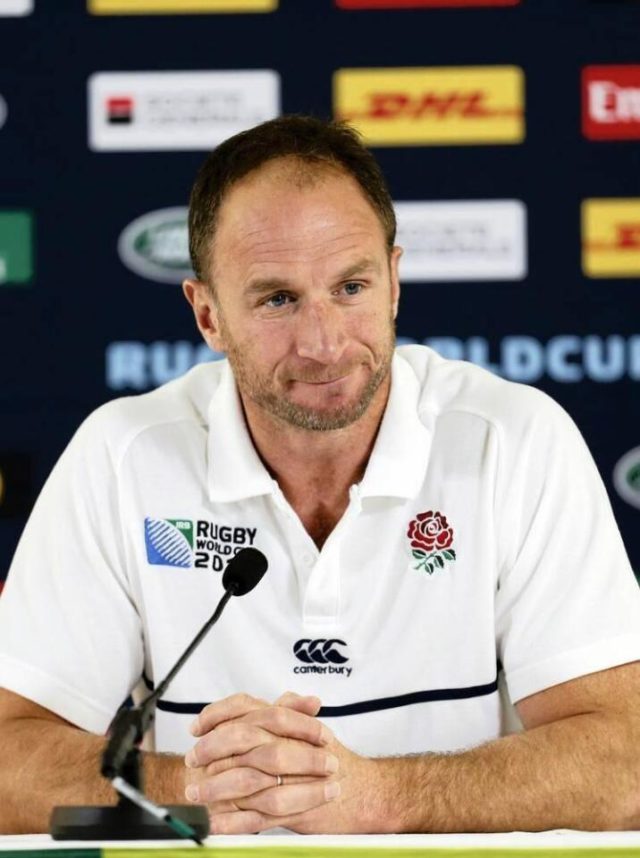In today’s instalment of the Glory of ’95 series, ASHFAK MOHAMED looks at back the career of South African-born Englishman Mike Catt.
SOUTH AFRICAN born-and-bred England utility back Mike Catt is arguably most remembered for the dubious distinction of being run over by the mighty Jonah Lomu in the 1995 Rugby World Cup semi-final at Newlands.
But that would be doing a grave injustice to the man from Port Elizabeth. He was so much more than that and finished his international career with a 2003 World Cup winner’s medal, 75 Test caps for England and a 2007 World Cup final appearance – against his home country in Paris.
Perhaps a single regret was a lack of game time with the British & Irish Lions, with just one Test cap in 1997 in South Africa, while he was injured after being selected for the 2001 trip to Australia. He played over 200 matches for Bath and also had a long stint as a player and then player-coach at London Irish, and has continued with an impressive coaching career since.
But it was in PE where it all started for Catt, who was born to an English mother and South African father.
He attended Grey High – the alma mater of Springbok captain Siya Kolisi as well – and turned out for the Eastern Province junior and later senior team before trying his luck at Bath. The rest is history.
Catt made his England debut in 1994, and went on to play in every backline position except scrumhalf until he called it a day following the 2007 World Cup final.
He first made an impression as a fullback, and eventually beat the likes of Jonathan Callard and Paul Hull for the No 15 jersey at the 1995 World Cup.
He showed his versatility at the tournament, moving to flyhalf for Rob Andrew in the last Pool B match against Western Samoa in which he slotted a drop-goal as well.
But then it took just two minutes for Catt to be buried into the Newlands turf by a rampaging Lomu, who virtually trampled him into the ground.
New Zealand All Blacks winger Jonah Lomu charges through an attempted tackle by England’s fullback Mike Catt on his way to score the opening try in the Rugby World Cup semifinal at Newlands. Picture: Ross Setford,AP
Catt’s nightmare lasted throughout that Sunday afternoon, as he missed a tackle on opposite number Glen Osborne that led to a try, and just to finish things off, Lomu darted around him to send the All Blacks into the final.
But 24 years later, Catt only had fond memories of his time on the world stage – on home soil. “I love it,” Catt told the Rugby World Cup website at the 2019 edition, where he was the Italy attack coach.
“The whole competition was brilliant. It was my first World Cup. We’d beaten Australia the week before, won with a drop-goal by Rob Andrew.
“I’d played in most of the games, but then along came the big man (Lomu) and he ran over (Scotland fullback) Gavin Hastings, and then ran over me.
“I did everything right, other than Will Carling tap-tackling him and making him stumble towards me. The three times after that he just ran around me.
“He is one of the guys you wanted to win a medal because he changed the face of rugby overnight.”
Catt did get to taste World Cup glory in 2003, when he was operating outside Jonny Wilkinson as an inside centre, where he played a key role in helping to organise England’s attack as Martin Johnson’s side triumphed over the Wallabies in Australia.
It was remarkable that he managed to survive a number of difficult stages in his career to reach the 2007 World Cup final, where the Springboks held on for a 15-6 victory over England in Paris.
Catt was appointed as England’s backs coach in 2012 under Stuart Lancaster, but that four-year stint ended on a sour note as they were knocked out in the group stages on home soil in 2015. But he has remained in the Test arena since. He was the Italy attack coach from 2016 to the 2019 World Cup, where the Azzurri were knocked out in the group stages as well, and Catt had the honour of coaching against the Boks in his sixth tournament (four as a player).
“I love World Cups. They are a bit of a drug,” he said last year.







